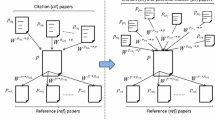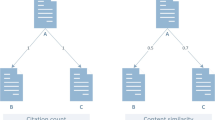Abstract
Existing scholarly publication recommenders were designed to aid researchers, as well as ordinary users, in discovering pertinent literature in diverse academic fields. These recommenders, however, often (i) depend on the availability of users’ historical data in the form of ratings or access patterns, (ii) generate recommendations pertaining to users’ (articles included in their) profiles, as oppose to their current research interests, or (iii) fail to analyze valuable user-generated data at social sites that can enhance their performance. To address these design issues, we propose PReSA, a personalized recommender on scholarly articles. PReSA recommends articles bookmarked by the connections of a user U on a social bookmarking site that are not only similar in content to a target publication P currently of interest to U but are also popular among U’s connections. PReSA (i) relies on the content-similarity measure to identify potential academic publications to be recommended and (ii) uses only information readily available on popular social bookmarking sites to make recommendations. Empirical studies conducted using data from CiteULike have verified the efficiency and effectiveness of (the recommendation and ranking strategies of) PReSA, which outperforms a number of existing (scholarly publication) recommenders.








Similar content being viewed by others
Notes
See wiki.citeulike.org/index.php/Social_Features for all the social features offered by CiteULike.
Words in the Wikipedia documents were stemmed after all the stopwords were removed. From now on, unless stated otherwise, (key)words/tags refer to non-stop, stemmed (key)words/tags.
A blocking strategy is a filtering technique that reduces the potentially very large number of comparisons to be made among records, i.e., publications in CiteULike in our case.
The implementation of S V M rank is available at cs.cornell.edu/people/tj/svm_light/svm_rank.html.
We have empirically established that, on the average, it takes 4 seconds to train the RankSVM using 11,000 training instances to determine the weight of each measure employed by PReSA for ranking candidate publications. The training instances do not overlap with the dataset described in Section 4.1, which is used to assess the overall performance of PReSA.
I D C G 10,i is computed as D C G 10,i using an ideal ranking such that the recommendations are arranged in descending order of their relevant judgment scores in the ranking.
References
Adomavicius, G., & Kwon, Y. (2012). Improving aggregate recommendation diversity using ranking-based techniques. IEEE Transactions on Knowledge and Data Engineering (TKDE), 24, 896–911.
Basu, C., Hirsh, H., Cohen, W., Nevill-Manning, C. (2001). Technical paper recommendation: a study in combining multiple information sources. Journal of Artificial Intelligence Research (JAIR), 1, 231–252.
Belem, F., Martings, E., Pontes, T., Almeida, J., Goncalves, M. (2011). Associative tag recommendation exploiting multiple textual features. In International ACM conference on research and development in information retrieval (SIGIR) (pp. 1033–1042).
Bellogin, A., Cantador, I., Castells, P. (2010). A study of heterogeneity in recommendations for a social music service. In International workshop on information heterogeneity and fusion in recommender systems (pp. 1–8).
Bogers, T., & van den Bosch, A. (2008). Recommending scientific articles using CiteULike. In ACM conference on recommender systems (RecSys) (pp. 287–290).
Bogers, T., & van den Bosch, A. (2011). Fusing recommendations for social bookmarking websites. International Journal of Electronic Commerce (IJEC), 15(3), 33–75.
Bourke, S., McCarthy, K., Smyth, B. (2011). Power to the people, exploring neighbourhood formations in social recommender system. In ACM conference on recommender systems (RecSys) (pp. 337–340).
Croft, W., Metzler, D., Strohman, T. (2010). Search engines: information retrieval in practice. Addison Wesley.
De Francisci Morales, G., Gionis, A., Lucchese, C. (2012). From chatter to headlines, harnessing the real-time web for personalized news recommendation. In ACM international conference on web search and data mining (WSDM) (pp. 153–162).
Ekstrand, M., Kannan, P., Stemper, J., Butler, J., Konstan, J., Riedl, J. (2010). Automatically building research reading lists. In ACM conference on recommender systems (RecSys) (pp. 159–166).
Guan, Z., Wang, C., Bu, J., Chen, C., Yang, K., Cai, D., He, X. (2010). Document recommendation in social tagging services. In International world wide web conferences (WWW) (pp. 391–400).
Hoscher, C., & Strube, G. (2000). Web search behavior of internet experts and newbies. Computer Networks, 33, 337–346.
Jiang, Y., Jia, A., Feng, Y., Zhao, D. (2012). Recommending academic papers via users’ reading purposes. In ACM conference on recommender systems (RecSys) (pp. 241–244).
Joachims, T. (2002). Optimizing search engines using click-through data. In ACM SIGKDD conference on knowledge, discovery, and data mining (pp. 133–142).
Knijnenburg, B., Bostandjiev, S., O’Donovan, J., Kobsa, A. (2012). Inspectability and control in social recommenders. In ACM conference on recommender systems (RecSys) (pp. 43–50).
Koberstein, J., & Ng, Y.-K. (2006). Using word clusters to detect similar web documents. In Second international conference on knowledge science, engineering, and management (KSEM 2007) (pp. 215–228).
Konstas, I., Stathopoulos, V., Jose, J. (2009). On social networks and collaborative recommendation. In International ACM conference on research and development in information retrieval (SIGIR) (pp. 195–202).
Koren, Y. (2010). Factor in the neighbors: scalable and accurate collaborative filtering. ACM Transactions on Knowledge Discovery from Data (TKDD), 4(1): 24. Article 1.
Ma, H., Zhou, D., Liu, C., Lyu, M., King, I. (2011). Recommender systems with social regularization. In ACM international conference on web search and data mining (WSDM) (pp. 287–296).
McNee, S., Kapoor, N., Konstan, J. (2006). Don’t look stupid: avoiding pitfalls when recommending research papers. In ACM conference on computer supported cooperative work (CSCW) (pp. 171–180).
Naak, A., Hage, H., Ameur, E. (2009). A multi-criteria collaborative filtering approach for research paper recommendation in papyres. In MCETECH (pp. 25–39).
Nascimento, C., Laender, A., da Silva, A., Goncalves, M. (2011). A source independent framework for research paper recommendation. In ACM/IEEE joint conference on digital libraries (JCDL) (297–306).
Neumann, A. (2009). A survey of recommender systems at major sti providers. In Recommender systems for information providers, contributions to management science (pp. 1–12).Physica-Verlag HD.
Parra, D., & Brusilovsky, P. (2009). Collaborative filtering for social tagging systems: an experiment with CiteULike. In ACM conference on recommender systems (RecSys) (pp. 237–240).
Pera, M.S., & Ng, Y.-K. (2011). A personalized recommendation system on scholarly publications. In ACM conference on information and knowledge management (CIKM) (pp. 2133–2136).
Pudhiyaveetil, A., Gauch, S., Luong, H., Eno, J. (2009). Conceptual recommender system for CiteSeerX. In ACM conference on recommender systems (RecSys) (pp. 241–244).
Ricci, F., Rokach, L., Shapira, B., Kantor, P. (2011). Recommender systems handbook. Springer.
Sugiyama, K., & Kan, M. (2010). Scholarly paper recommendation via user’s recent research interests. In ACM/IEEE joint conference on digital libraries (JCDL) (pp. 29–38).
Zobel, J. (2004). Writing for computer science. Springer.
Author information
Authors and Affiliations
Corresponding author
Rights and permissions
About this article
Cite this article
Pera, M.S., Ng, YK. Exploiting the wisdom of social connections to make personalized recommendations on scholarly articles. J Intell Inf Syst 42, 371–391 (2014). https://doi.org/10.1007/s10844-013-0298-8
Received:
Revised:
Accepted:
Published:
Issue Date:
DOI: https://doi.org/10.1007/s10844-013-0298-8




